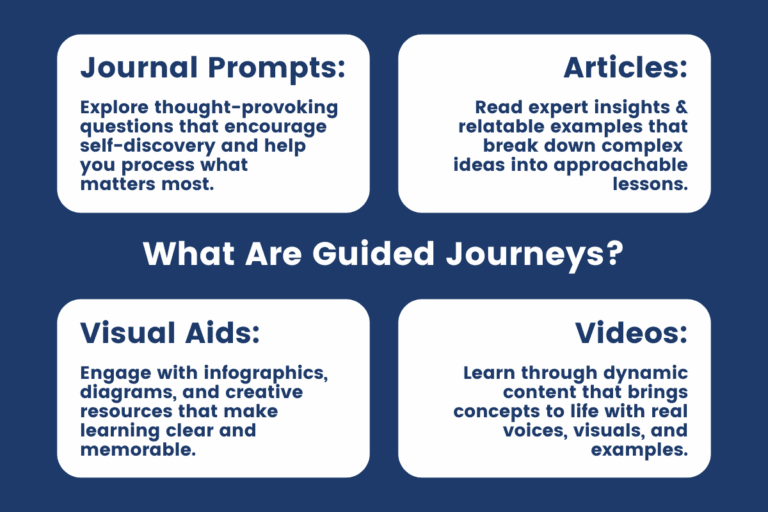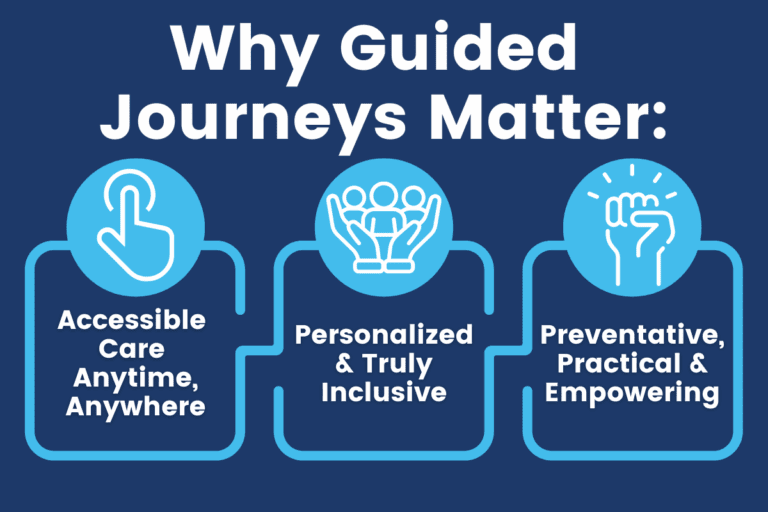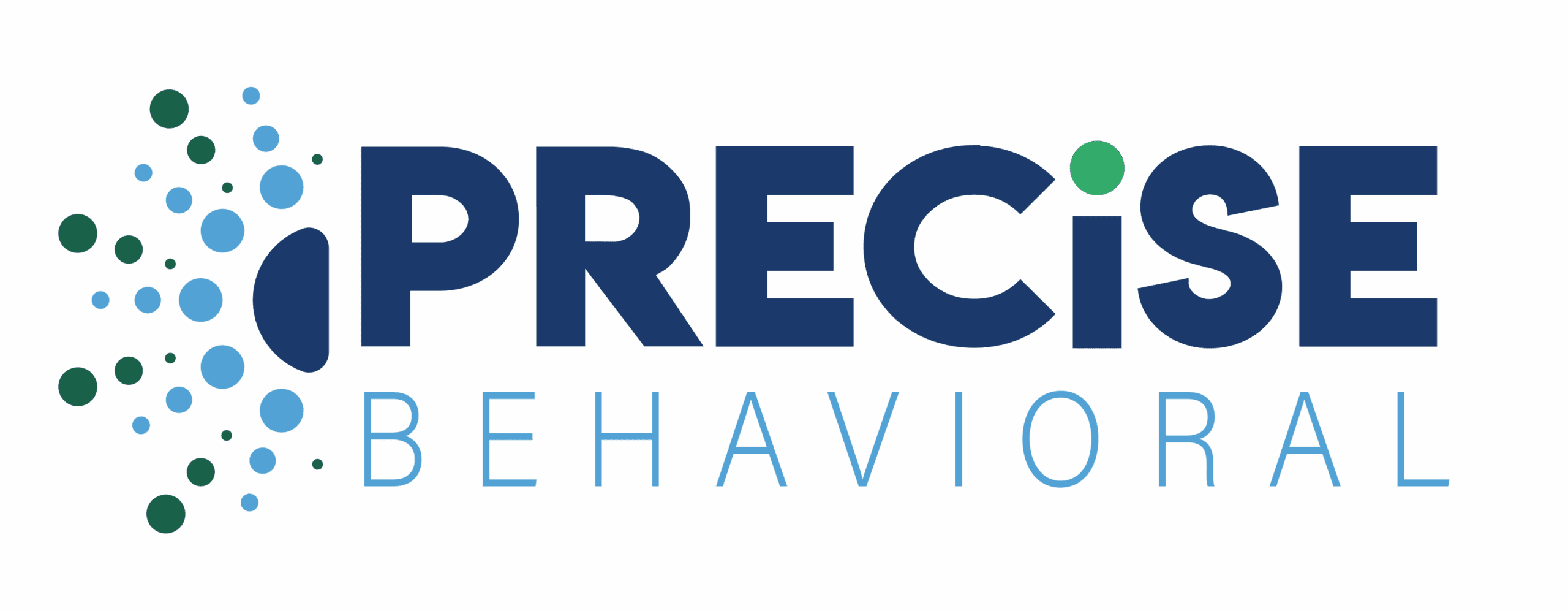Guided Journeys: A New Era in Personalized Mental Health Guided
Care That Meets You Where You Are: How Our Guided Journeys Transform Care
At Precise Behavioral Health, we believe that mental health care should be just as unique as the people who seek it. Whether it’s a teen with ADHD, a young adult with depression, someone managing daily anxiety, or a combination of mental health needs, each person needs personalized support. No two individuals experience a mental health condition in the same way, and no single solution can address the complex needs of the diverse communities we serve. For years, digital platforms have promised convenience and access, but many leave users with nothing more than a library of generic articles or tools that feel disconnected from the realities of daily life. Our approach is different. We’re designing care that meets people exactly where they are, in the moments they need it most, through clinically relevant assessments, collaborative care, telehealth counseling, and guided, personalized support.
That philosophy comes to life in our newest innovation within the Precise Digital app: Guided Journeys. These carefully crafted, clinician-approved pathways are changing the way people access and apply mental health support. More than just a collection of resources, Guided Journeys are structured, evidence-based experiences that provide education, practical strategies, and meaningful reflection, all woven into a step-by-step format designed to help individuals move forward. Our Guided Journeys include articles, journal prompts, videos, and visual aids to help guide you down a path, offering various tools to help you understand your condition and feel your best.

Currently, our app offers Guided Journeys focused on two of the most common mental health challenges adults face today: anxiety and depression. Anxiety disorders affect about 4% of the world’s population, yet only one in four people with the condition receive treatment, while depression impacts about 5.7% of adults worldwide, making both conditions among the most pressing mental health challenges today (World Health Organization, 2023, 2025). Together, these numbers show just how widespread anxiety and depression are, and why creating accessible, effective tools for mental health is so essential.
Each of these journeys offers not only knowledge but also actionable tools to apply in daily life. And soon, we’ll be launching a Guided Journey tailored to ADHD—an essential next step in our mission to expand access to effective care for neurodivergent communities through online behavioral health innovations.
The Value of Guided Journeys
The idea behind Guided Journeys is simple but powerful. Instead of overwhelming individuals with a wide range of disconnected resources, we offer a curated pathway that builds one step at a time. Users are helped to navigate the resources available in the app. They move through a guided process that introduces concepts gradually, layering new skills on top of each other in a way that is manageable, sustainable, and designed to create lasting change.
These journeys integrate multiple modes of support. Educational articles explain the “why” behind mental health symptoms and treatment approaches. Journaling prompts provide opportunities for self-reflection, helping individuals apply new insights to their own lives and encouraging them to utilize the supportive features in the app of mood tracking and journaling. Videos and visual aids make concepts more accessible and engaging, while interactive exercises bring coping strategies into the present moment. Together, these elements transform information into action, giving users the confidence and tools to manage their symptoms.
What makes Guided Journeys unique is their balance between structure and flexibility. The steps are laid out in a clear sequence, yet users can progress at their own pace. Knowing that you are taking steps toward completion of a task and a deeper understanding of yourself builds a sense of agency within a person (Wen et al., 2015). Building agency (the confidence that someone can effect change on their environment) is crucial for battling mental health disorders (Lin et al. (2024). The design acknowledges that healing does not always happen in a straight line, and some days may call for more effort than others. This combination of guidance and adaptability creates a deeply personal experience while maintaining a reliable framework rooted in evidence-based practices.
Navigating Anxiety: Learning to Find Calm
For many people, anxiety feels like living in a constant state of high alert. It may appear as racing thoughts, intrusive worries, or sudden panic attacks that seem to come out of nowhere. For others, it’s a quiet but persistent sense of unease that permeates in their bodies while performing even the simplest daily tasks. The Anxiety Guided Journey was designed with this complexity in mind.
This Guided Journey helps individuals first recognize the specific ways anxiety shows up in their lives. By shining a light on thought patterns, physical symptoms, and situational triggers, it allows people to understand their anxiety in a new way. Once awareness is established, the journey introduces strategies to help manage and reframe those patterns. Breathing and grounding exercises provide immediate relief during moments of heightened anxiety, while journaling prompts encourage long-term reflection and growth.
The Anxiety Guided Journey also works to address the stigma that still surrounds this condition. Many individuals, particularly teenagers and young adults, feel pressure to hide their struggles or “just care less.” Others avoid reaching out because therapy feels intimidating or inaccessible. By offering a safe, digital space filled with tools and knowledge, we are breaking down barriers and showing that help does not have to mean a long wait, a high cost, or the vulnerability of an in-person session. Support can be immediate, accessible, and on-demand—without sacrificing quality or compassion.
Depression: Small Steps, Real Progress
Depression presents its own set of challenges, often convincing individuals that they are stuck or that reaching out is pointless. In the most difficult moments, people may feel isolated, numb, or weighed down by guilt and hopelessness. Even when help is available, depression often diminishes motivation to seek it, creating yet another barrier to care.
The Depression Guided Journey was created to meet individuals at this difficult crossroads. Rather than demanding large leaps, it encourages small, consistent steps that build momentum over time. Each part of the journey introduces techniques grounded in research, helping users recognize unhelpful thought patterns, shift their routines, and restore a sense of hope and agency.
Alongside educational content and journaling exercises, the Depression Guided Journey emphasizes the value of structure and gentle accountability. Tools like mood tracking make progress visible, even when it feels slow or invisible to the individual. This visibility is powerful, offering reminders that change is possible and that small steps add up to real transformation. The journey is not about forcing positivity but about creating space for growth, healing, and self-compassion.
By weaving these supports into a digital platform, Precise Behavioral Health makes care accessible anytime and anywhere. Individuals can engage with the journey when they have energy and return to it when they need encouragement. This flexibility is essential for depression, where rigid schedules and overwhelming demands often make traditional care difficult to sustain.
Looking Ahead: ADHD and the Neurodivergent Community
While anxiety and depression remain the most common mental health concerns, they are far from the only ones. At Precise, we are committed to addressing the needs of neurodivergent populations, beginning with the development of our next Guided Journey for Attention Deficit Hyperactivity Disorder.
ADHD is often misunderstood as nothing more than distraction, hyperactivity, or even laziness. In reality, it is a difference in brain activity, and it impacts executive function, making it difficult to manage memory, organization, task-switching, and impulse control. These challenges can affect every aspect of life, from school and work to relationships and self-esteem. The ADHD Guided Journey will take a behavior-based approach that will focus more on creating systems and rhythms in your environment that support you in areas that you need support.
The Guided Journey will introduce strategies designed specifically for the ADHD brain, such as breaking down tasks into manageable steps, building supportive routines, and leveraging rewards and motivation rather than relying on shame or punishment. It will also highlight ways to reframe common frustrations, empowering individuals to understand their unique patterns and work with them rather than against them.
By prioritizing the development of ADHD-focused tools, we reaffirm our dedication to creating accessible, personalized care for all members of the neurodivergent community. We understand that mental health support cannot be one-size-fits-all, and we are committed to designing solutions that reflect the full diversity of human experience.

Why This Matters
The launch of Guided Journeys marks an important milestone not just for Precise Behavioral Health, but for the future of digital mental health care. Too often, individuals seeking help are met with overwhelming choices, generic advice, or support that feels disconnected from their actual needs. Guided Journeys offer something different: personalized, evidence-based care that is easy to access, easy to use, and designed to make a meaningful difference.
These journeys are more than just an app feature. They are part of a larger movement to shift the way mental health care is delivered. We are prioritizing following clinically proven approaches to treat and manage mental health disorders. By combining smart technology with human oversight, we ensure that users are never navigating their struggles alone. From journaling and mood tracking to live therapy and coaching, we create a holistic system that adapts to each person’s unique circumstances.
For employers, providers, and community partners, this innovation also offers an opportunity to expand access to care while reducing costs. Preventative tools like Guided Journeys help reduce the need for crisis interventions, saving both time and resources. More importantly, they empower individuals to take an active role in their own wellness, building resilience and creating healthier communities overall.
An Invitation to Join Us
At Precise Behavioral Health, we believe that the right care changes everything. Anxiety, depression, ADHD, and other mental health challenges are not problems to be solved with quick fixes. They are deeply personal experiences that require compassionate, tailored, and flexible solutions. Guided Journeys represent our commitment to that vision, providing accessible support that empowers individuals to take steps toward healing and growth—no matter where they are starting from.
We invite you to explore our Guided Journeys within the Precise Digital app and see firsthand how personalized care can create real change. And for organizations seeking to expand access and reduce barriers, we welcome you to partner with us in bringing this innovation to more people who need it. Together, we can transform the landscape of mental health care, creating solutions that are not only effective but sustainable, inclusive, and built for real life.
Because care that knows the difference makes all the difference.
Learn more and explore our Guided Journeys at Precise Behavioral Health.
References:
World Health Organization. (2023, September 27). Anxiety disorders https://www.who.int/news-room/fact-sheets/detail/anxiety-disorders?utm
World Health Organization. (2025, August 29). Depressive disorder (depression). https://www.who.int/news-room/fact-sheets/detail/depression
Wen, W., Yamashita, A., & Asama, H. (2015). The sense of agency during continuous action: performance is more important than action-feedback association. PloS one, 10(4), e0125226. https://doi.org/10.1371/journal.pone.0125226.
Lin, J., Yang, X., Li, H., Lin, W., Zhang, J., & Lei, Y. (2024). Enhancing Agency in Individuals with Depressive Symptoms: The Roles of Effort, Outcome Valence, and Its Underlying Cognitive Mechanisms and Neural Basis. Depression and anxiety, 2024, 3135532. https://doi.org/10.1155/2024/3135532
Written by Greta Baker and Emily Yi
Editorial Contributor
This piece was edited by Kirsten Guiliano.



